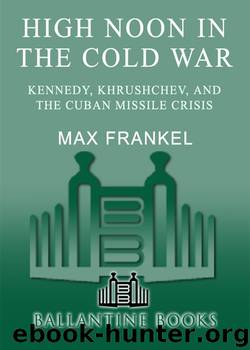High Noon in the Cold War by Max Frankel

Author:Max Frankel
Language: eng
Format: mobi, epub
Tags: Fiction
ISBN: 9780345480491
Publisher: Random House Publishing Group
Published: 2004-09-27T20:00:00+00:00
KENNEDY HAD OUTPERFORMED Gromyko but he faced still greater tests of his acting skills on Friday, when he finally confronted the Joint Chiefs of Staff before flying off on what was advertised as a three-day campaign tour of seven states.
The president knew the chiefs wanted a massive surprise attack on Cuba, advice that he had rejected. He would not have it said, however, that he never heard their arguments firsthand. With McNamara and Taylor at his side, Kennedy engaged the individual chiefs—General Curtis LeMay, the pugnacious leader of the air force, still highly respected for his World War II derring-do and commander of the airlift that had broken the Berlin blockade; General Earle Wheeler of the army, an accomplished planner and Pentagon politician; Admiral George Anderson, known throughout the navy as a “straight arrow”; and General David Shoup of the marines, a tough, crude, highly decorated combat veteran.
The president preempted the opening minutes of the meeting to explain his preference—and obvious decision—for a blockade and his hope that it would compel a negotiated and favorable outcome. The chiefs referred contemptuously to this approach as mere “political action” and “talk.” The president tried hard to hide his mistrust of the bemedaled men before him, the same chiefs who had failed him by not critiquing the CIA’s invasion plan for the Bay of Pigs and failed again recently by not providing a swift show of force to preserve order at the University of Mississippi. Kennedy also muffled what he knew would irritate the military mind: his intention to use the forces arrayed in the Caribbean not to wage war but to send a diplomatic message to Moscow. Only hours earlier, he had remarked to O’Donnell that “these brass hats have one great advantage in their favor. If we listen to them, and do what they want us to do, none of us will be alive later to tell them that they were wrong.”
Still, Kennedy recited his reasoning respectfully. If he did nothing, he told the chiefs, the Russians would have gained an important base in Cuba and damaged American prestige the world over. But if he attacked without warning, as they wanted, he would provoke—and justify—Soviet action in Berlin. And that might force him to resort to nuclear weapons, inviting the contempt of the allies for “trigger-happy Americans.”
The chiefs would have none of it. General LeMay doubted the Russians would retaliate for an attack in Cuba. A blockade, he warned dismissively, would only drive their mobile missiles into the woods. And “political action”—negotiation—would only lead to war. His defiant conclusion was that the president’s chosen course “is almost as bad as the appeasement [of Hitler] at Munich.” Admiral Anderson concurred: Only a surprise attack would prevent the missiles being fired against the United States; a blockade was sure to intensify the threat. General Wheeler argued that the Russians’ deployment stood to gain them a “quantum jump” in ability to damage the United States. The army chief thought foreigners and Americans alike would look upon a blockade and political talk as “a pretty weak response.
Download
This site does not store any files on its server. We only index and link to content provided by other sites. Please contact the content providers to delete copyright contents if any and email us, we'll remove relevant links or contents immediately.
| Africa | Americas |
| Arctic & Antarctica | Asia |
| Australia & Oceania | Europe |
| Middle East | Russia |
| United States | World |
| Ancient Civilizations | Military |
| Historical Study & Educational Resources |
Red Famine: Stalin's War on Ukraine by Anne Applebaum(2920)
Midnight in Chernobyl by Adam Higginbotham(2540)
Chernobyl by Serhii Plokhy(2534)
Midnight in Chernobyl: The Untold Story of the World's Greatest Nuclear Disaster by Adam Higginbotham(2219)
Red Shambhala by Andrei Znamenski(2191)
The House of Government by Slezkine Yuri(2190)
The Gulag Archipelago (Vintage Classics) by Aleksandr Solzhenitsyn(2092)
Red Notice by Bill Browder(2068)
All the Kremlin's Men by Mikhail Zygar(2062)
From Cold War to Hot Peace by Michael McFaul(2027)
Putin's Labyrinth(2015)
From Russia with Lunch by David Smiedt(1969)
The Future Is History by Masha Gessen(1904)
A People's Tragedy by Orlando Figes(1862)
The Romanovs by Simon Sebag Montefiore(1819)
How to Tame a Fox (and Build a Dog): Visionary Scientists and a Siberian Tale of Jump-Started Evolution by Lee Alan Dugatkin & Lyudmila Trut(1760)
The Lost Spy by Andrew Meier(1745)
Putin's Labyrinth: Spies, Murder, and the Dark Heart of the New Russia(1740)
Art and Revolution by John Berger(1720)
